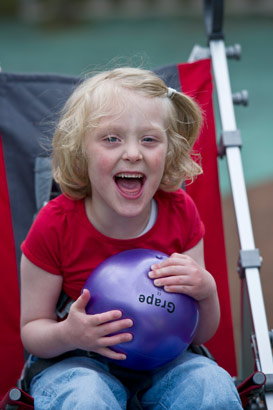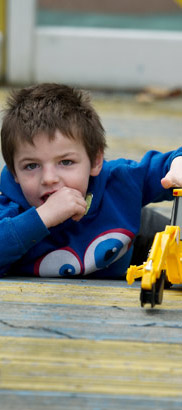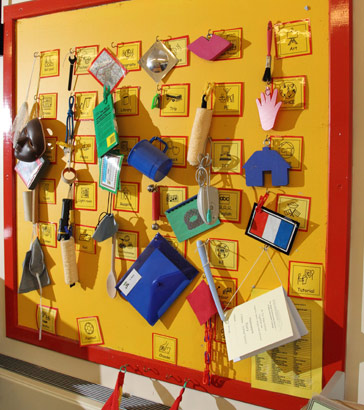Child development theorists have shaped educators' thinking about how children learn. Educators use their ideas daily in the classroom (for example, Bruner's scaffolding approach, the behaviourists' backward chaining, etc.)
...a theory of development is a scheme or system of ideas that is based on evidence and attempts to explain, describe,
and predict behavior and development.
Slater et al, 2003
Theory serves as a guide to action... By formulating a theory, we attempt to make sense of our experiences... Only then
can we predict and influence the world around us
Crandell, 2012

Each child development theorist builds on previous theories. For example, Jean Piaget was the first western theorist to
suggest that children constructed their own understanding by interacting with their environment (constructivism). This was
a radical departure from the behaviourist idea of the child as a blank slate, learning only through conditioning and Freud's
focus on psychosexuality.
Vygotsky criticised Piaget's 'lone scientist' concept and promoted the social construction of learning (social constructivism).
Building on Vygotsky's thinking, Bruner developed scaffolding and the spiral curriculum, while Bandura integrated social and
cognitive theories with behaviourism (social learning theory). (Lindon, 2010; Pound, 2008)
Click here to read about some great educators.

Theorists can be grouped according to their main focus. Some straddle more than one category (for example, Albert Bandura bridges socio-cultural, cognitive and behaviourist theories; Lev Vygotksy can be seen as a cognitive or socio-cultural theorist. Today, educators' assumptions and actions are influenced in part by all of these theorists.
Psychodynamic
Sigmund Freud
Erik Erikson
John Bowlby
Behaviourist
John Watson
Burrhus Frederick Skinner
Albert Bandura
Cognitive
Jean Piaget
Lev Vygotsky

Systems
Systems theories suggest that child development is a dynamic in which individuals both affect and are affected by their own biology, family and wider context.
Dynamic systems
Presents development as a dynamic, self-organising system which maintains stability by adjusting to accommodate variation (for example, genetic, social, cognitive, physical) (Thelen and Smith, 2006).
Transactional systems theory
Focuses on the continuous dynamic interaction between the developing child and his or her family and social context and how each affects the other (Davis, 2011).
Ecological systems theory
Developed by Urie Bronfenbrenner. Four nested systems, each interacting with and affecting the developing child throughout
life at different levels: child/biology; family/daily settings; community; Society/culture
(Evangelou et al, 2009).

Individuals develop as participants in their cultural communities, engaging with others in shared endeavours and building
on cultural practices of prior generations...For example, comparing children's rate of development is a cultural practice
that has accompanied bureaucratic organisation of children's progress through compulsory schooling. This practice has developed
over a little more than a century in the US and Europe.
Rogoff, 2007
Our ideas about child development are culturally determined. Some of our cultural aspirations (for example, independence, autonomy) are not shared by other cultures that value interdependence.


Crandell, T.L., Crandell, C. and Vander Zanden, J.W. (2012) Human Development (10th edn). McGraw Hill.
Davis, D. (2011) Child Development: A practitioner's guide. New York, NY: The Guilford Press.
Davis, P. and Florian, L. (2004) Teaching Strategies and Approaches for Pupils with Special Educational Needs: A scoping study. London: Department for Education and Skills.
Evangelou, M., Sylva, K. and Kyriacou, M., Wild, M. and Glenny, G. (2009) Early Years Learning and Development: Literature review. Annesley: DCSF Publications.

Lindon, J. (2010) Understanding Child Development: Linking theory and practice. London: Hodder Arnold.
Pound, L. (2008) How Children Learn: From Montessori to Vygotsky – educational theories and approaches made easy.
London: Step Forward Publishing
Rogoff, B. (2007) The William James Book Award: The Cultural Nature of Human Development, The General Psychologist,
42 (1), 4-7.
Slater, A., Hocking, I. and Loose, J. (2003) Theories and issues in child development. In: A. Slater and J.G. Bremner
(eds) An Introduction to Developmental Psychology. Oxford: Blackwell.
Thelen, E. and Smith, L.B. (2006) Dynamic systems theory. In: Damon, W.D. and Lerner, R.M. (eds) Handbook of
Child Psychology (vol. 1): Theoretical models of human development (6th edn). New York, NY: John Wiley.